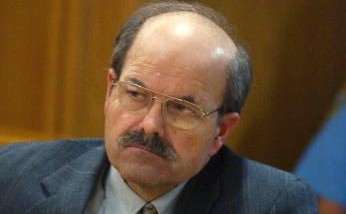|
Dennis Rader - BTK killer - A biography
County Jail
Dennis Rader was taken to an interrogation room after his arrest on
February 25, 2005. At first he wouldn't talk much about the crimes,
playing dumb or avoiding the subject. When he was confronted about the
traced computer disk and the DNA match, he started to talk.
In fact, he wouldn't stop talking. In a stunning 30 hour confession,
he rambled on endlessly about his crimes, as though proudly reciting his
achievements. Never-before-known details of all his crimes, his methods,
his mind all came to light. Many excerpts of what he said in that
interview can be read in the 92 page pdf document State's Summary of the
Evidence.
On the 26th of February, Rader's first mugshot was taken. He looks
unkempt, which was out of chararcter for Rader, but had been up all
night confessing. When it was all over, though, he was taken to his cell
and left there alone. There he began to realize that the cops were not
on his side after all. His interrogators had been feeding his ego all
along, pretending to be impressed by Rader to get him to keep talking.
He bought the whole package.
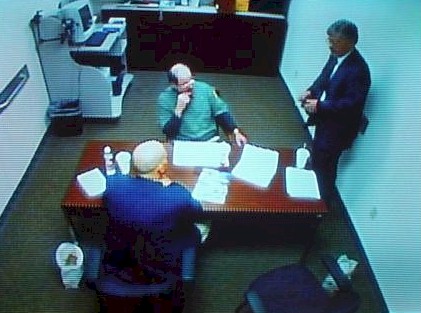
Rader was astonished during the interview when he found out the
detectives had lied to him about it being safe to send in a computer
disk. He lamented how he thought they had such a good rapport. Lt.
Landwehr had to calmly explain that they were trying to catch a serial
killer.
Rader had always had a strong need to feel accepted by police on a
personal level. He thrived on the camaraderie displayed by the
detectives, but after it was all over his elation turned to despair. The
next interviews were with lawyers, and they caused him to stop the
confessing.
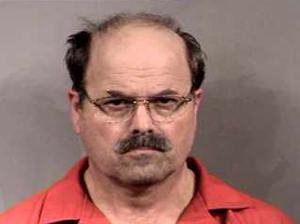
On March 1, the public got their first live look at the newly
incarcerated BTK suspect as he appeared briefly via video link to be
informed by Judge Greg Waller of the charges against him. Word of his
confessions had sporadically leaked out into the media, and police chief
Norman Williams took unusually strong action to plug the leaks, denying
everything that was going around in the media and threatening to
imprison police personnel who were talking openly about the case.
In America you are presumed innocent unless you declare your guilt
in a court of law. Rader had ceased confessing and became tight-lipped
about what he might have done. But the District Attorney's office did
state that Dennis Rader was being charged with 10 counts of first degree
murder, adding the names Marine Hedge and Dolores Davis to the known
list of BTK victims.
Rader's house and office had been raided, and plenty of
incriminating evidence had been found to back up the 10 counts. It came
to light later that the "mother lode" was located in Rader's filing
cabinet in his office in city hall in Park City. Original copies of BTK
letters, victim driver's licenses, photos, newspaper clippings, artwork
and more were all found locked in his office.
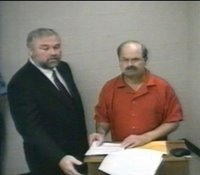
Meanwhile a barrage of information about Dennis Rader was tossed
about by the news media. Not one person who had ever known him had ever
suspected he was or even could be BTK. No one had turned him in during
the intense 11 month investigation that followed BTK's initial
reemergence in March 2004. There were people like Mary Capps who thought
he was a jerk, but he just didn't come across to anyone as a vicious
serial killer. Rader's wife and children were described as being in a
deep state of shock. A procession of neighbors and friends all testified
to the media that they never would have guessed Rader was capable of the
crimes he was being charged with. The congregation of Christ Lutheran
Church, led by pastor Michael Clark, was left stunned, confused and
bewildered.
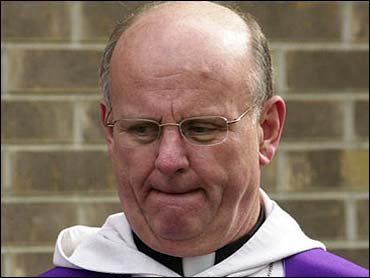
In March 2005 the long-awaited book by Robert Beattie was released,
"Nightmare in Wichita - the Hunt for the BTK Strangler". BTK's
reemergence and subsequent arrest delayed the release till this time.
Beattie is credited as being a major player in the process that
culminated in Dennis Rader's arrest.
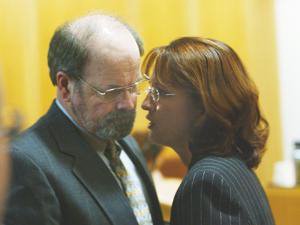
Rader's first court appearence occurred on April 19, 2005. He waived
his right to a preliminary hearing and postponed entering a plea, a move
that disappointed many who wanted to hear the state's case against him.
Judge Waller continued the hearing until May 3, at which time Rader
remained mute in front of a crowded and tense courtroom while Waller
entered a plea of not guilty.
During the hearing he was, however, confronted by District Attorney
Nola Foulston who notified him that he was being charged under the
Kansas "hard 40" law for the 1991 murder of Dolores Davis, the only
murder to occur after that sentencing law went into effect in 1990. That
law required a minimum prison sentence of 40 years for any murder
considered particularly cruel or heinous. The other nine murders
occurred in years in Kansas where the minimum sentence was 15 years. The
death penalty did not resume in Kansas until 1994.
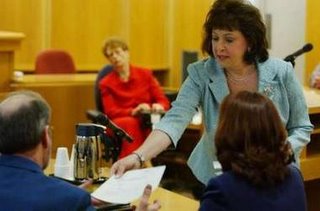
Rader was initially kept alone and separate in the Sedgwick County
Jail, only seen by his three court-appointed lawyers, his pastor and
whoever else he permitted to visit him. His wife and chidren refused to
visit. There were some letters exchanged. However, Rader soon developed
a number of penpals scattered in various locations. He wrote poetry,
including an incriminating poem called Black Friday which appeared to
describe his arrest while acknowledging his dark side.
In a surprise move, county jail officials decided to allow Rader
live in a pod where he could mingle with other hardened criminals during
the daytime. He was an instant hit with his podmates, who called him
"Radar" or "The Suspect". He would chat about sports, religion, crime or
anything else and play cards. He soon earned the title "the Podfather".
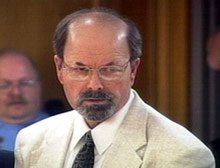
Dennis Rader's trial on the 10 counts of first degree murder was set
for June 27, 2005. As the date approached with no news of a postponement,
speculation erupted about what Rader was up to. It became apparent that
he would use that appearence to formally plead guilty, and he did so.
The event turned into a dramatic courtroom confession, as Judge
Waller began to quiz Rader over some of the details of the crimes.
Before millions of viewers watching live coverage on Kansas local
stations, on Court TV nationally and worldwide on the Internet, Rader
calmly revealed some of the grisly details of his murders from his own
perspective, talking about strangulations, hit kits, ruses, projects,
etc. as if they were all an everyday thing.
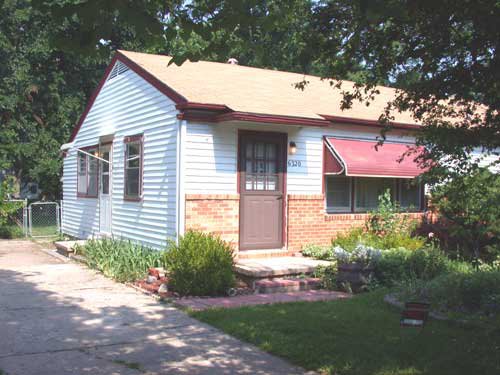
There was considerable fallout following the confession. One by one,
each of the victims' families filed lawsuits against Rader seeking
damages. There was little hope of recovering any monetary damages from
him, but the idea was to prevent Rader from profiting from his crimes in
any way, such as by selling book or TV rights to his story.
On July 26, 2005 his wife Paula filed for an emergency divorce
citing physical and mental distress, and was immediately granted the
divorce. Rader had agreed to give up ownership rights on the small house
he shared with his wife as well as all other belongings the couple owned.
She could benefit from two pension funds Dennis had established.
Soon after the divorce was granted, the family home at 6220
Independence Street in Park City went up for auction. Appraised at
$57,000, a benevolent bidder offered $90,000. However the house sale
fell through over legal issues. Some of the victims' families objected
to the inflated selling price, calling it "blood money" due to the
notoriety of BTK. They demanded in court that the excess, about $30,000,
belonged to them and not to Paula. The bidder refused unless the full
price went to Paula and later backed out of the deal.
Up to this point prosecutors still had not had the opportunity to
formally present their case against Dennis Rader. Rader's own admissions
in court were graphic, but diluted with claims of having attempted to
comfort victims before their deaths, instead of the outright acts of
torture that they were.
At the sentencing hearing on August 17 and 18, 2005, prosecutors
finally had their turn to present some of the accumulated evidence
against Rader in open court. As there was the possibility of leniency
since the sentence had to be determined by the judge, the presentation
was designed to show why Rader should be sentenced to the maximum
permitted by law, which amounted to a minimum of 175 years to life in
prison. Rader was now 60 years old and it was desired that he never be
eligible to walk the streets of freedom again.
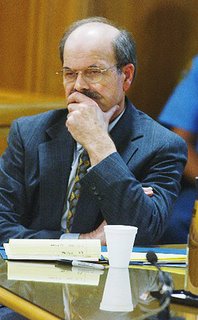
Judge Greg Waller listened patiently to two full days of testimony.
Individual detectives representing the cases of the Oteros, Kathryn
Bright, Shirley Vian, Nancy Fox, Marine Hedge, Vicki Wegerle and Dolores
Davis all gave statements illustrated with grim crime scene and autopsy
photos in front of a packed courtroom and another large international
television audience.
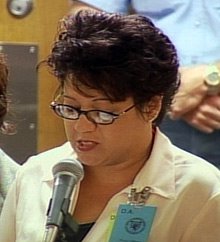
After testimony was completed, individual members of the victims'
families were permitted to air their grievances to Rader in court.
Moving statements were given from Carmen Montoya (Otero) and Charlie
Otero, Kevin Bright, Steve Relford and Richard Vian, Fred Fox the
brother of Nancy Fox and her sister Beverley Plapp, Rod Hook the son-in-law
of Marine Hedge, Bill Wegerle and daughter Stephanie, and from Jeff
Davis the son of Dolores Davis and Davis' daughter Laurel Keating.

After this Rader was permitted to give his own statement. He rambled
on for over 20 minutes, delivering a semi-apology to everyone and going
on mostly about himself. It took on the air of someone giving a speech
to a church group, thanking all the people who had helped him recently.

At the end of the proceeding on August 18 Judge Waller sentenced
Dennis Rader to the maximum sentence permitted by law, a minimum of 175
years to life in prison. He will not be elgible for parole until 2180.
Sedgwick County District Attorney Nola Foulston requested special
conditions for Rader's sentence, stating that he should be denied access
to materials that could feed his fantasies.
The Big House
On the morning of August 19, 2005 Rader was taken to his new home,
the El Dorado Correctional Facility in El Dorado, Kansas. Two boxes he
wanted sent to the mother of friend Kristin Casarona were seized by
authorities before they could be sent. They appeared to contain a lot of
his writings in jail. He was processed, shaved and photographed. All
entering inmates undergo an intial period of evaluation and testing, to
determine how and where they will be housed in the jail.
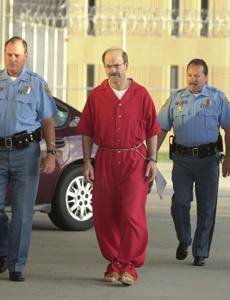
On October 12, 2005 a hearing was held at the prison regarding
Rader's privileges in jail. District Attorney Nola Foulston again made
the plea to Judge Greg Waller to deny drawing materials and access to
media and interviews, stating Rader has the ability to turn normal
things like newspaper and magazine underwear advertisements into
fantasies of bondage and torture. Investigators had found a huge number
of what Rader called "slick ads" that had been altered by him into
pictures of bondage stashed away in his office and home.
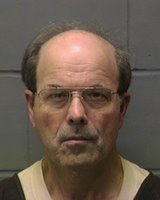
Rader's public defender Steve Osburn argued that basic first
amendment rights were being denied.The outcome of the hearing was that
Judge Waller agreed with all prosecutor recommendations. Waller also
ruled that Rader must register as a sexual offender and must pay
restitution to victims. Prison officials have indicated that Rader has
been classified as a specially managed inmate, but that not all of the
restrictions may be enforceable. He will be permitted to earn privileges
such as access to television, radio, newspapers and news magazines.

Another odd fact that came to light as a result of the evidence
seized from Rader's "mother lode" was his obsession with self-bondage.
Detectives found a number of photos Rader had taken of himself all tied
up in various ways. He was also fond of dressing up in items stolen from
his female victims. Using a Polaroid camera and a tripping mechanism, he
took many photos of himself in these ways.
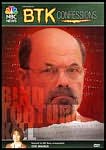
Some notable television programs were produced in 2005 on the
subject of Dennis Rader. In August shortly before the sentencing
Dateline NBC aired a two hour special, 31 Years of the BTK
Killer, featuring interviews with Rader in prison by Robert
Mendoza, a forensic psychologist who had been hired by the defense to
evaluate him. It also reviews the crimes and some of the impact they had.
At this writing Mendoza is being sued by the state of Kansas for
unauthorized usage of the filmed interview. CBS 48 Hours Mystery aired
an excellent program called BTK: Out of the Shadows,
featuring the Wegerle family and also reviewing the history of the BTK
case. CBS aired a television movie called The Hunt for the BTK
Killer. The A&E network produced two excellent programs on the
BTK case, including a special edition of Cold Case Files.
In 2006 a low-budget film was released to video, BTK Killer.
Possibly one of the worst films ever made, we specifically advise
against seeing this film. It is a disgusting affront to everyone
involved in the BTK case, particularly the victims and their families.
Almost nothing at all in this film is true, everything is factually
distorted in a most disgusting way involving insects and slaughterhouses
and more. It is crude and fictitious, and horribly made as well.

On October 20, 2006 a jury awared $1.1 million to former BTK suspect
Roger Valadez, who had been arrested on December 1, 2004 but quickly
exonerated by a DNA test. He had sued the then-owners of local Wichita
station KSNW channel 3 for defamation and humiliation by broadcasting
his name and address after his arrest. However, Roger Valadez died
suddenly of a heart attack on November 27, 2006 well before the
possibility of collecting any money.

In January 2007 the city of Park City bought the small home in Park
City where Dennis and Paula Rader had lived since the 1970s and raised
their two children. It had been sitting empty since soon after the
arrest. The selling price was reportedly, according to the Wichita Eagle,
just under $60,000. The city tore the house down to improve access to a
nearby small park in March 2007.
The latest information available is that there are three more books
about Dennis Rader being written. The editors of the Wichita Eagle are
to publish a book written by three reporters who covered the case. Well-known
true crime author and former FBI prolifer John Douglas is writing a book
he calls the definitive work on the case, scheduled for publication in
August 2007. Kristin Casarona is a woman from Topeka, Kansas who
befriended Rader while he was in the Sedgwick County jail and still
keeps in contact.
She says she is writing a book based on their many meetings in jail.
Was originally described as a book from the Christian perspective, is
now described as Rader's biography. Casarona says the book should be
completed by autumn 2007, and that 75% of any profits from the book will
be given to the families of the BTK victims. She strongly denies any
romantic interest in Rader and says their friendship is based on mutual
religious interests.
In March 2007 some of the legal issues surrounding lawsuits in the
BTK case were settled. Rader agreed to pay the victims' families $10
million and forfeit any media rights to his story. The families will
also have any belongings that were seized as evidence during the
investigation returned to them, and will also have rights to any other
evidence seized from Dennis Rader. The families are likely to receive no
money at all from this settlement, as Rader is effectively indigent. But
it will permanently prevent him from profiting from his notoriety as a
serial killer.
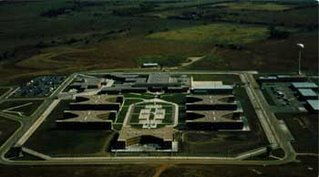
News about Dennis Rader since his assignment to the maximum security
El Dorado Correctional Facility has been scant. He appears to have
settled into the routine of the prison, but is likely kept well away
from the general population for his own safety. His family, relatives
and ex-wife have all intentionally stayed away from any media exposure
and have never granted interviews.
dennisraderbtk.blogspot.com |

